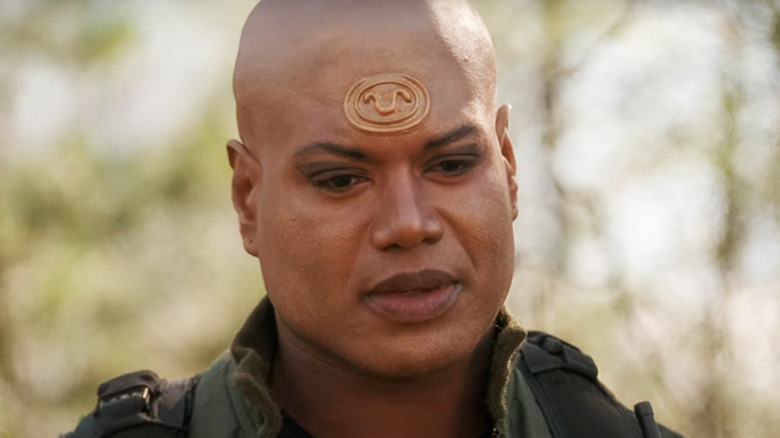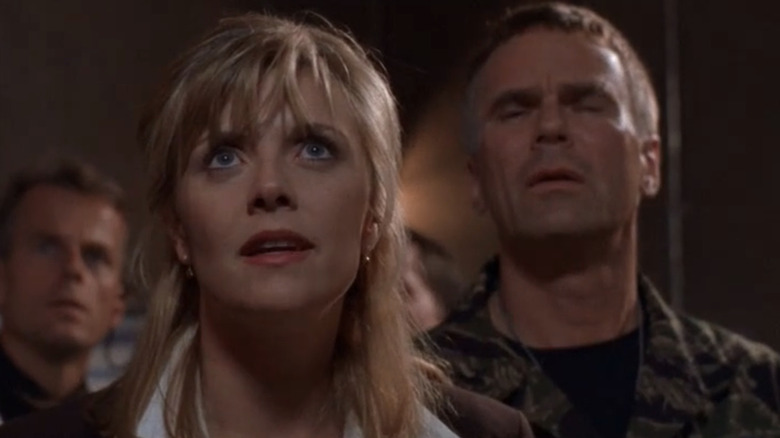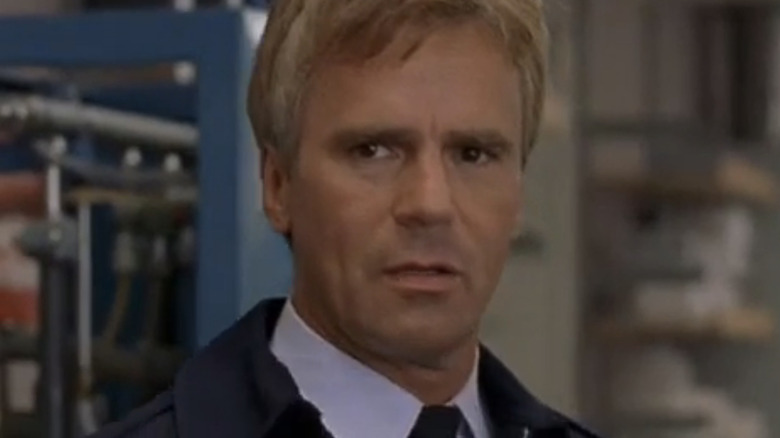Stargate SG-1 Had To Make Some Major Changes Thanks To The Air Force
"Stargate SG-1" doesn't seem like the kind of show that maintained any significant dedication to realism. After all, this was a sci-fi series about a crew of intergalactic explorers who travelled the universe via an ancient portal (which, as it happens, led to some big problems for the SG-1 VFX team). But it turns out authenticity was more integral to the series than you might think, at least in one important way.
In the world of the Stargate, the Stargate program itself is part of the U.S. Air Force, and it seems that particular branch of the military was a big fan of the show. The Air Force recognized Richard Dean Anderson for his depiction of Air Force General Jack O'Neil when Chief of Staff General John P. Jumper made him an honorary brigadier general for "the show's continuous positive depiction of the service." General Jumper himself also appeared in scenes from the season 7 episode "The Lost City, Part 2," which followed a cameo appearance from former Chief of Staff General Michael E. Ryan in the season 4 episode "Prodigy."
But this wasn't just a case of Air Force members being fans of the show. Throughout 10 seasons of "SG-1" (the show was cancelled by the Sci-Fi channel in 2007), the Air Force consulted on the series, helping the writers keep their depiction of the service accurate. What's more, it seems the producers and writers took input from the Air Force seriously enough that they had to make some significant changes to multiple episodes of "SG-1."
Stargate SG-1 had to take real Air Force rules into account
In SyFy's oral history of the "Stargate SG-1," executive producer Robert C. Cooper revealed changes that were made to a couple of episodes, demonstrating how the Air Force wasn't merely a supporter of the show and its depiction of the U.S. military, but involved enough to have creative input. The first major change came with the season 1 episode "There But for the Grace of God." In this early installment, Dr. Daniel Jackson (Michael Shanks) finds himself in an alternate reality after touching a Quantum Mirror. In this new timeline, Samantha Carter is no longer an Air Force captain but a civilian scientist, while Jack O'Neill remains a Brigadier General — and the two are engaged.
Throughout "Stargate SG-1," there was a palpable tension between Carter and O'Neill, with fans expecting the two to get together at some point. The writers played on this expectation, too, most notably in season 4 episode "Divide and Conquer," wherein Jack admits that he cares about his colleague "a lot more than [he's] supposed to." There was even unproduced dialogue from season 1 that hinted at the pair's romantic status, but after 10 seasons of "SG-1," Sam and Jack never officially got together.
In "There But for the Grace of God," however, the writers could use their alternate timeline story to explore what a relationship between the two might look like. In order to make this happen, it seems they needed to make a big change to Carter's biography. Why? Because an Air Force brigadier entering into a relationship with a captain is prohibited within the service. According to Cooper, the Air Force was "pretty stuck" on not depicting such a relationship, and so he and the writers "ended up getting around it by having Carter be a civilian in the other reality." He continued:
"We thought the relationship was more important than the military designation and figured let's just not have Carter be a captain in that version. Those are the types of things where occasionally we would have to make some creative changes in order to accommodate the notes, but for the most part, having the affiliation and having their expertise and support in making our show look and feel more authentic was well worth it."
But this wasn't the only change spurred by an objection from the Air Force. Later in the show's run, the writers were yet again faced with either using their original idea and jeopardizing the series' relationship with the U.S. military or making an accommodation. They went with the latter.
The Air Force were touchy about Area 51 in Stargate SG-1
In SyFy's oral history of "Stargate SG-1," Robert C. Cooper detailed another adjustment that he and the writers had to make after the Air Force objected to a specific line. This particular issue arose from the show's inclusion of the real-life military base at Area 51. Everybody knows that infamous location's reputation, but it seems the Air Force was keen not to encourage any extra-terrestrial associations.
In the world of "Stargate," which includes all the movies and TV shows, Area 51 is a secret Air Force base that's home to a research facility for the Stargate program. In a season 2 episode of "SG-1," entitled "Touchstone," the crew suspects the National Intelligence Department is using Earth's second Stargate, which is stored in Area 51, prompting Jack O'Neill and Teal'c (Christopher Judge) to pay the site a visit. When they arrive, they're greeted by Air Force Major Albert Reynolds (Eric Breker). O'Neill then asks the Major, "Is this where you're keeping the little green men?" But it seems the real Air Force wasn't all that fond of the line.
As Cooper explained, the Air Force called the writers and said, "There are no aliens at Area 51." Cooper continued, "We said, 'We're not saying there are. Jack is just asking a question," But that wasn't good enough. Series co-creator and executive producer Jonathan Glassner added, "They said, 'there are no aliens at Area 51, period.' We said okay, it was a joke, so I went back to them the next day and said, 'how about if Jack says present company excluded, talking about Teal'c, and accepts that there are no little green men there?' and they said that's fine."
This is how the interaction plays out in the actual episode, with Reynolds saying explicitly, "There are no alien life forms at Area 51," before O'Neill replies, "Present company excluded, of course." While the writers satisfied themselves and the Air Force by including these lines, it does seem a bit odd that the Air Force would deny the existence of aliens at Area 51 to a man whose job is to travel to alien worlds and another who is a literal alien. But at least "SG-1" didn't get on the bad side of the U.S. military.


